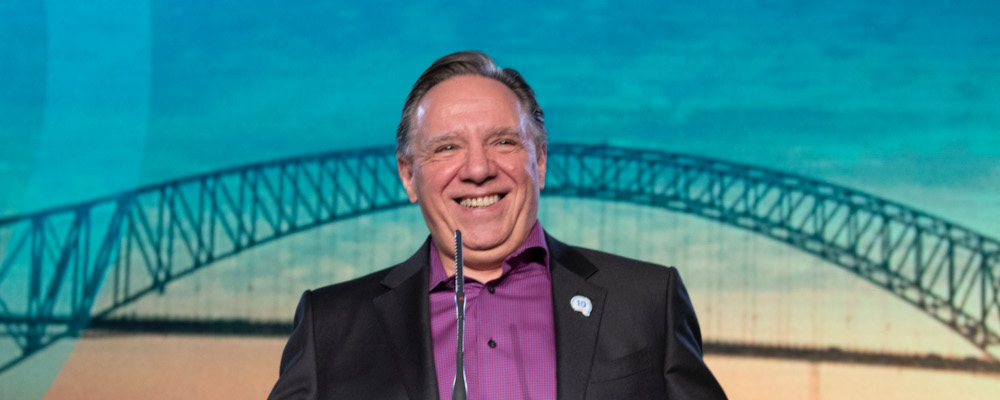Looking back one decade to the founding of Quebec’s most transformational political party in a generation, it is safe to conclude the Coalition Avenir was not, as many fellow anglophone critics feared, meant to be a crypto-sovereignist movement.
We did however expect its leaders to behave similarly to the Parti Québécois with its quarrelsome ethnocentric nationalism. In that sense, the politically-ambiguous centre-right CAQ has already in its short lifespan usurped the PQ, becoming the vehicle for the province’s anti-federalist forces and pushing Canada toward a series of constitutional crises.
Launched in Montreal at a chic Lachine Canal loft in November 2011 as a diverse, reform-oriented coalition, the CAQ was vague on national unity since differing views within the party comprised of federalists and sovereignists were, and continue to be, irreconcilable.
Even before the party unveiled a policy it was already obvious which of the forces—federalist or nationalist—would be more influential. The somewhat amusing pronunciation of the party’s acronym in English was an early sign, media observers mused, that the CAQ’s more federalist-leaning English-speakers would be politically impotent.
While it never put a third sovereignty referendum on the table, the party eventually made a hard turn away from federalism and toward a brazen, décomplexé nationalism; the strategic compromise at the root of today’s brewing crises.
It took seven years and two third-place election losses for CAQ founder and now-Premier François Legault to drop all ambiguity about a third referendum. Ahead of the 2018 vote, the former PQ minister made the clear promise, even directly to me on Twitter after years of my persistent trolling on the issue since the party’s inception:
“A CAQ government would never hold a referendum on Quebec sovereignty,” he promised.
The crypto-sovereignist charge had mostly been made in jest but, in the end, the joke would be on me as the premier doesn’t appear to need a referendum in order to separate Quebec from Canada, at least in a few key areas of interest for nationalists. All he needs are disengaged federalist opponents.
This Petit Compromis between Quebec and Canada became apparent in late 2018 following Legault’s win over former Liberal Premier Philippe Couillard, weighed down by years of vague corruption smears and nationalist panic over “austerity” even as government spending continued to rise. An imploding PQ was even less popular than the besieged Couillard government, and Legault quite aptly chose the path of least resistance to becoming premier.
Legault can’t have his Canada and eat it, too, I wrote in my final weekly column for The Montreal Gazette then. While I applaud those who take a genuine interest in Quebec politics and the future of French in Canada, this Petit Compromis epoch means basic policy issues of interest to cosmopolitan democrats will barely advance until principled federalists return to government, or at least opposition in Quebec City and Ottawa.
Refusing to engage Legault on federalism and human rights—specifically on bills that attempt to rewrite Canada’s constitution to erase minority language rights in Quebec and ban civil servants in positions of authority from wearing religious symbols—is morally wrong and legally dubious but also a cultural timebomb for establishment parties when pollsters who bother to measure the phenomenon point to overwhelming support for federalism among young Quebecers (70 percent according to international polling firm IPSOS).
A clear majority of Quebecers are permanently closed to the idea of sovereignism.
A generation of Canadian political leaders, including the prime minister, federal opposition leaders, and even the provincial Liberal opposition leader Dominque Anglade, have effectively given up on the Charter and principled federalism in Quebec when a clear majority of Quebecers are permanently closed to the idea of sovereignism.
Federalism is not the hard sell much of Quebec’s nationalist-leaning commentariat makes it out to be, and that this point needs emphasizing is an indication of the level of strategic incompetence that is currently plaguing Canada’s political establishment.
Despite the miscalculations, a growing federalist constituency exists—the much-maligned pro-bilingualism, pro-Canada Couillard proved that with his decisive 2014 win—and it will be served one way or another.
In Montreal’s municipal elections last week, a hastily-organized diversity-focused party emerged as a third option amid debate of special status for Montreal to shield it from the CAQ’s ethnocentric policies. If the unpopular Anglade Liberals do not dramatically change course, they risk eroding their federalist base and perhaps even losing Montreal strongholds next year for the first time in a generation.
The chaos that Legault has fomented isn’t even limited to Quebec, with premiers in Saskatchewan, Alberta, and Ontario mimicking the sort of constitutional subversion that had previously been contained to sovereignist movements—just without the moral legitimacy of actual, committed sovereignists.
Saskatchewan Premier Scott Moe even flaunted his nationalism last week, proclaiming the province “needs to be a nation within a nation.”
The short-term outlook for federalists is bleak as sincere efforts are required to restore interest in the Canadian project.
Looking further ahead, even if the CAQ finishes off the sovereignist PQ next year and becomes Quebec’s clearinghouse for ethnocentric politics, the good news for federalists is that Legault’s victory will be short-lived as a demographic tidal wave of cosmopolitan Québécois millennials (including the “wokes” the premier fears) will come crashing down on nationalists of all stripes.
Despite being morally flexible on human rights issues related to freedoms of expression, Legault will be remembered as a transitional figure in Quebec politics, not unlike René Lévesque. And like Lévesque, some of his core values are incompatible with Canada’s in the long run. At an impasse, the non-sovereignist nationalist with a one-decade plan to change Quebec has settled into the role of caretaker for Lévesque’s movement, one its own leading philosophers describe as dying.
Many will view the CAQ’s Petit Compromis as a necessary transitory period following the Quiet Revolution, an uncomfortable middle ground en route toward a more multicultural francophone society. Time will tell how unfavourably the constitutional compromises will be seen.
By choosing to perpetuate the ethnocentric strain of Quebec nationalism past its natural shelf life, however, we know Legault and his ostensibly federalist enablers have placed themselves on the wrong side of a generational divide, and in the process made us all a little less Canadian, for a time.
Recommended for You

‘A celebration of the spirit of Alberta’: Ryan Hastman on the political, economic, and cultural importance of the Calgary Stampede

‘Can we actually be an independent country?’: Michael Ignatieff on the 60th anniversary of Lament for a Nation

Fred DeLorey: Why the NDP may be in even bigger trouble than we think

DeepDive: Canada desperately needs its own Department of Government Efficiency—but one with a heart




